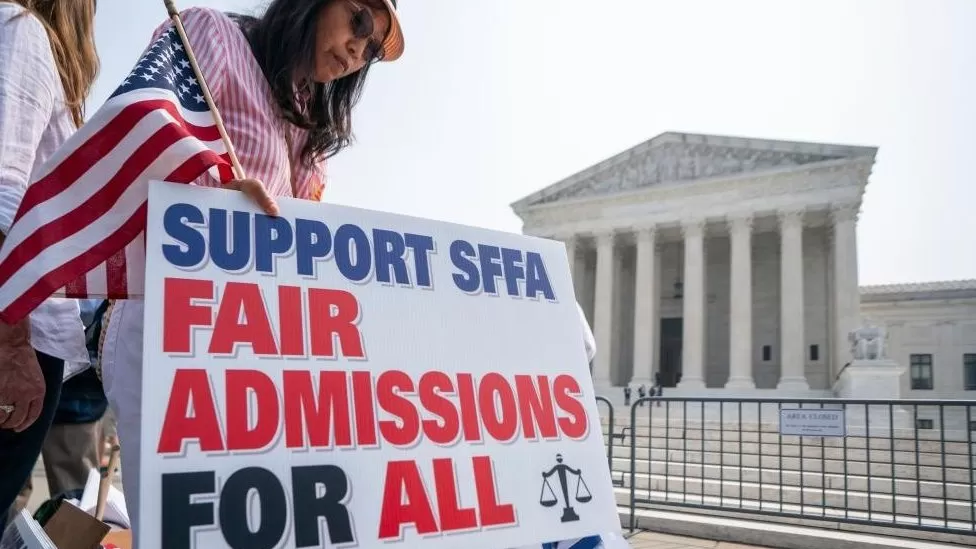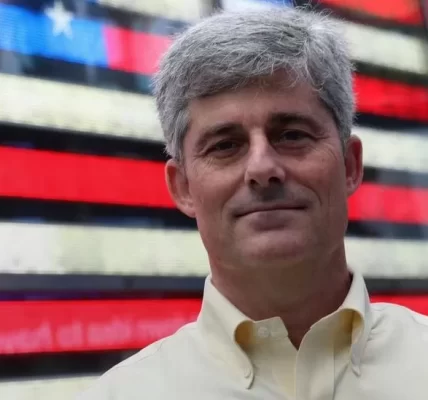Affirmative action: The United States Supreme Court rules against race-based college admissions.
The momentous decision upends decades-old US affirmative action rules, commonly known as positive discrimination.
It is one of the most divisive subjects in American education.
Affirmative action entered policy in the 1960s and has been defended as a means of increasing diversity.
US President Joe Biden stated that he “strongly” disagreed with the court’s judgment and that the country would require “a new path forward that is consistent with the law.”
“We cannot let this decision be the last word,” he stated. “Discrimination persists in America.”
The admissions lawsuits included Harvard and the University of North Carolina (UNC). The conservative majority of the court ruled 6-3 against UNC and 6-2 against Harvard.
The justices sided with a group called Students for Fair Admissions, which was formed by a conservative activist named Edward Blum.
Last October, the group contended in court that Harvard’s race-conscious admissions strategy violated Title VI of the 1964 Civil Rights Act, which prohibits discrimination based on race, color, or national origin.
“Many universities have for far too long wrongly concluded that the touchstone of an individual’s identity is not challenges overcome, skills developed, or lessons learned, but the color of their skin,” wrote Chief Justice John Roberts.
His majority opinion called UNC and Harvard’s regulations “well-intended.”
“Harvard’s admissions process is based on the pernicious stereotype that a black student can usually bring something that a white person cannot offer,” he wrote.
Justice Clarence Thomas, the nation’s second black justice and a conservative who has long argued that affirmative action programs are “patently unconstitutional,” wrote.
“The self-proclaimed righteousness of universities does not give them license to discriminate on the basis of race,” he stated.
According to the Supreme Court, the decision does not preclude colleges from examining an applicant’s “discussion of how race affects his or her life.”
Justice Sonia Sotomayor, one of the liberal justices to dissent, noted that the ruling “rolls back decades of precedent and momentous progress.”
According to her, the decision “establishes a superficial rule of colorblindness as a constitutional principle in an endemically segregated society.”
Ketanji Brown Jackson, a black dissenting liberal justice, remarked that the judgment is “truly a tragedy for us all.”
“Today, the majority, with let-them-eat-cake obliviousness, pulls the ripcord and declares ‘colorblindness for all’ by legal fiat,” she remarked.
However, Justice Roberts argued that the dissenting justices had omitted elements of the statute that they disagreed with.
“Most troubling of all is what the dissent must make these omissions to defend: a judiciary that picks winners and losers based on the color of their skin,” he said.
UNC Chancellor Kevin Guskiewicz said in a statement that while the judgment is not what the university “hoped for,” it will study it and “take any necessary steps to comply with the law.”
According to Harvard President Lawrence Bacow, “we will certainly comply with the court’s decision.” He went on to say that the Ivy League school was still committed to having “a community of people from diverse backgrounds, perspectives, and lived experiences.”
Mr. Blum, the founder of Students for Fair Admission, welcomed his organization’s win in the landmark decision.
He described it as “the beginning of the restoration of the colorblind legal covenant that binds our multi-racial, multi-ethnic nation together.”
“These discriminatory admission practices have undermined the integrity of our country’s civil rights laws,” he stated.
The verdict was welcomed as a “great day” by former US President Donald Trump, the current Republican contender for next year’s election.
Americans with “extraordinary ability and everything else required for success,” he added on social media, are “finally being rewarded.”
The Supreme Court has twice ruled in favor of affirmative action programs at US universities, most recently in 2016.
Arizona, California, Florida, Georgia, Oklahoma, New Hampshire, Michigan, Nebraska, and Washington are among the nine states that have previously banned race-based college admissions.
In California, voters rejected a 2020 ballot question to reinstate affirmative action, which had been prohibited for 24 years.
Many US leftists were outraged last year when the conservative-leaning Supreme Court voted to overturn Roe v Wade, a 1973 law that provided women abortion rights.
Liberals have applauded many recent verdicts, including one on Native American child care and three others on election regulations in Alabama, Louisiana, and North Carolina.




